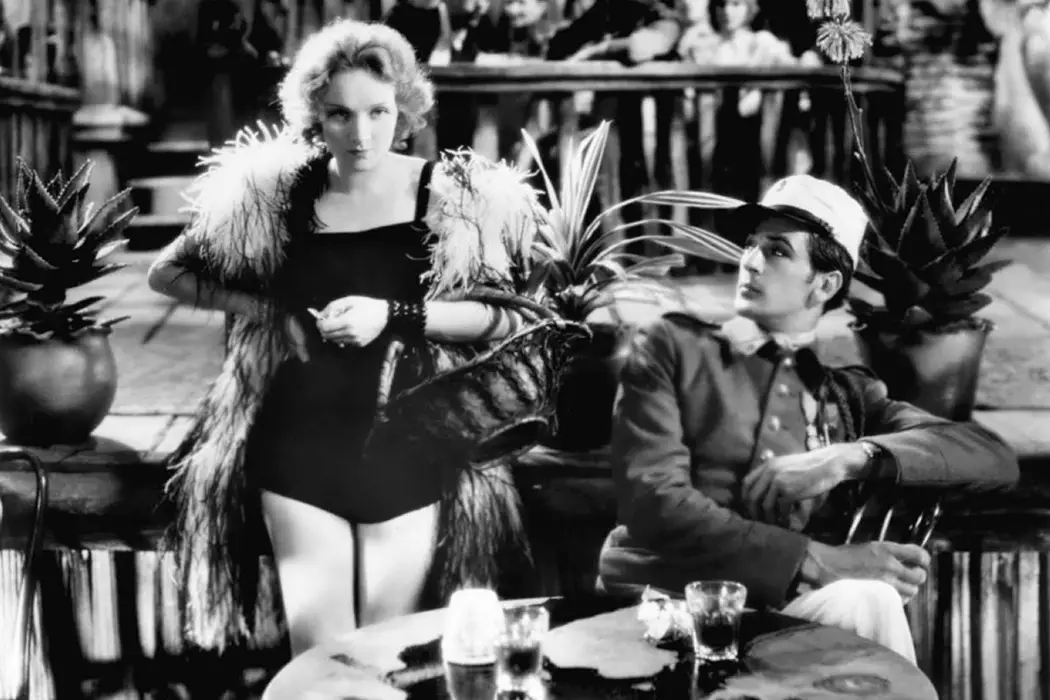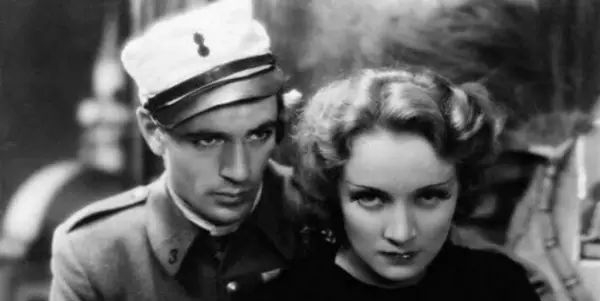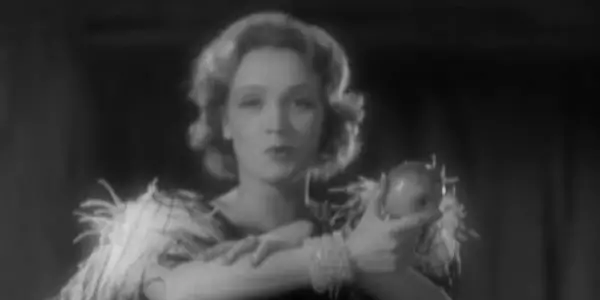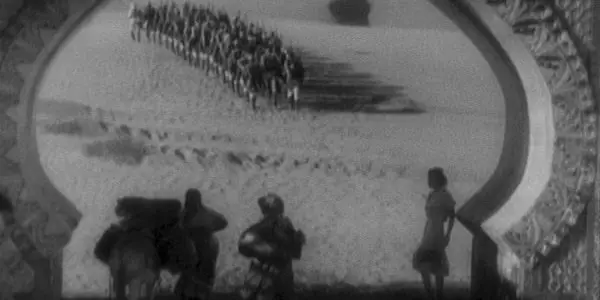MOROCCO: The Cheekiest Romance Since The Fall

Tynan loves nagging all his friends to watch classic movies…
Marlene Dietrich burst onto the scene in The Blue Angel and, subsequently, her director and the cinema instantly fell madly in love with her. Before the Hollywood exoticism of Algiers, Casablanca, or even Road to Morocco, there was Josef von Sternberg’s follow-up collaboration with his iconic muse, boasting a vibrant atmosphere of its own.
Although Morocco involves soldiers – and one soldier in particular – it’s hardly a war film, instead, it utilizes its backdrop to present a love affair as only von Sternberg could. With a sultry Dietrich in her Hollywood debut matched with a particularly cheeky Gary Cooper, it instantly presents an intriguing dynamic of two polar opposites. She, a radiant German beauty with an evocative pair of eyes to go with a somewhat sullen demeanor. He, America’s ruggedly handsome ideal of what a man should be – a strapping maverick of sorts.
All that matters is that they both find themselves in Morocco. Tom Brown (Cooper) is traipsing through town with his division, utilizing his idle hours to take in the floor show of cabaret singer Amy Jolly (Dietrich), along with the rest of the rowdy masses. Neither one of them has found someone good enough for them (or bad enough), and in that respect they’re equals. He’s a gentleman cad if you will, and she’s hardly an upstanding woman, making a living in a tawdry dance hall; but there’s more to her. It’s hinted that she once had something verging on true love, perhaps.
Romance of Oddities
It’s remarkable that, for such a short film, only about 90 minutes in length, it takes so long for them to actually speak to each other – but they’re flirting from the first moment that they lay eyes on one another. All through the cabaret show, so much is said through simple expressions.
Things proceed like so. She slips him a flower, then an apple, and finally a key. At this point, he gets the drift and we do too. Later that evening he winds up at her flat, and they spend their most substantial amount of time together. But it’s full of odd exchanges and meandering conversations that run the risk of sounding aloof. In fact, their entire relationship is replete with oddities. For being romantic protagonists, they sure don’t act like it at times.

Another man (Adolphe Menjou) is smitten with Amy, although he’s never driven to jealousy as convention might foretell. He’s good-natured and generous in all circumstances. People like him must only drift through high society. Perhaps their manners keep them from partaking in lurid love triangles. Still, she holds onto some wistful longing for the tall-dashing Legionnaire who knocked on her door, but she’s slow to act. Meanwhile, he hardly seems to take it as a blow to his love life when she resigns to stay behind. After all, he’s quite the ladies man, so why does he need another woman? He’s always got several draped over each arm any given evening; married or unmarried, it makes little difference.
Moroccan Atmosphere
Josef von Sternberg once admitted the following wholeheartedly: “I care nothing about the story, only how it is photographed and presented…Shadow is mystery and light is clarity. Shadow conceals -light reveals. To know what to reveal and what to conceal and in what degrees to do this is all there is to art.” And given the contents and qualities of Morocco, that’s a pretty fair analysis of this film.
The director is invested in developing the world and bathing his actors in shades of light and dark –Dietrich in particular. It’s most overt with the shrouded back alleyways cloaked by night. That’s where trysts and ambushes take place. But even in daylight, numerous sequences are full of character, bustling with city life, or even the sedentary indoor shots purposefully covering their occupants in strips of light.
It’s all visually stimulating, thanks to the hands of the director working in tangent with veteran cinematographer Lee Garmes, and then simultaneously by Cooper and Dietrich as they work through their scenes both together and apart. Though it might in some ways lack emotional heft, its leads are still two invariably compelling romantic stars of the cinema.
What Am I Bid For My Apple?
Morocco undoubtedly exudes a certain mischievousness that can be affixed to the Pre-Code Era, when Hollywood was decidedly less strict. It’s not so much depicting licentiousness and debauchery forthright, but it wishes to playfully suggest as much. It can be implied without actually going through all the trouble of showing it – as a film might have free reign to do now. Although this particular film somehow still manages to be quite lithe and risqué when put up next to its contemporaries.
The most notable or notorious sequence, depending on how you want to look at it, involves Dietrich briefly kissing another woman, who is noticeably embarrassed by the ordeal. It should be noted that the actress also wore a top hat and tailcoat for the routine, a typically male ensemble – unheard of at that time. For his part, Cooper seems to get a kick out of the whole thing, because here’s someone who intrigues him with her own brand of upfront sensuality.

Our main protagonists seem to revel in their vices, or at the very least they’re apathetic towards them. Dietrich sums up the sentiments of the modern era perfectly with a little diddy concerning Adam and Eve. The line unfolds like so: “What am I bid for my apple, the truth that made Adam so wise? On the historic night, when he took a bite, they discovered a new paradise.”
If you consider the archetypal biblical narrative, in essence, the world got a lot more exciting at that fateful moment when sex and deceit coalesced and were brought into the equation. Having knowledge of Good and Evil means, if you so choose, you can have a greater propensity for so-called evil. Vice is more fun than virtue anyways. Maybe Amy misses the implications of the Fall of Man, but that’s precisely the point. It functions as pure Pre-Code sauciness, as there’s an undeniable flippancy attached to love and sex.
Still, the final lines of her song conclude with a cynical twist that invariably reflects a bit of Jolly’s own detachment. “An apple, they say, keeps the doctor away, while his pretty young wife has the time of her life, with the butcher, the baker, the candlestick maker. Oh, what am I bid for my apple?”

It’s a funny little joke, that wins a hardy laugh from the audience and a wry smile from its singer, but it cannot hide the actual hurt that permeates people’s lives. In some ways, The Fall may have been the greatest thing that ever happened to humans, but it also seems equally pernicious. It really all depends on how individuals formulate their perspectives of love. That’s one of the core questions underlying this film, as it dissects modern romance between two people accustomed to the ways of the world. Is love something to be taken seriously or is it simply an amusing diversion?
Walking Off Into the Desert
However, in the final moments, where Dietrich abandons her heels and goes slinking across the sand chasing after her man, it feels less like a romantic crescendo or even a tragic turn and more like a ploy by the director to make his leading lady the focal point of his story one last time. She is granted the final bit of limelight. Because, in many ways, Gary Cooper could not win when it came to upstaging his costar as orchestrated by her devoted director-partner. Thus, Morocco turns out to be a rather curious love story, different than some of the more typical Hollywood fare.
It’s easy to jump the gun and surmise this is more Dietrich’s film than Cooper’s. The image of her dress and kerchief both billowing in the desert breeze as she flies in pursuit of the long shadows cast by the receding Legionnairess ingrains itself on our minds. However, closer still, it’s von Sternberg’s picture, a moody love letter to the woman who inspired his art.
She is his starlet, the pygmalion-like beauty that he helped to craft on the silver screen as both sculptor and architect. Of course whereas the artist faded away, his stars had staying power, and that’s a testament to their skill as much as the personas they were able to develop. For that reason alone, Morocco is equally important in the early careers of its two leads.
Do you think Morocco still holds up as a romantic drama or is it simply an interesting historical relic? Does it come to any decisive conclusions on love?
Does content like this matter to you?
Become a Member and support film journalism. Unlock access to all of Film Inquiry`s great articles. Join a community of like-minded readers who are passionate about cinema - get access to our private members Network, give back to independent filmmakers, and more.
Tynan loves nagging all his friends to watch classic movies with him. Follow his frequent musings at Film Inquiry and on his blog 4 Star Films. Soli Deo Gloria.












